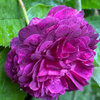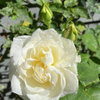Only for the brave! A blackspot experiment to try.
nandina
20 years ago
Related Stories

DECORATING GUIDES15 Rooms Bursting With Bravely Layered Patterns
With patterns mixed to bold effect, these rooms show that to the fearless sometimes go the style spoils
Full Story
COLORReady to Try Something New? Houzz Guides to Color for Your Kitchen
If only mixing up a kitchen color palette were as easy as mixing batter. Here’s help for choosing wall, cabinet, island and backsplash hues
Full Story
LIFEStressed Out? Try Hitting the Woodshop
Building things with your hands just might boost your mood while giving you personal new pieces for your home
Full Story
COLOR12 Tried-and-True Paint Colors for Your Walls
Discover one pro designer's time-tested favorite paint colors for kitchens, baths, bedrooms and more
Full Story
DECORATING GUIDES21 Ways to Arrange Carpet Tiles Like a Pro
Some Great Patterns to Try In Your Own Brave Custom Rug
Full Story
BATHROOM DESIGN8 Stunning and Soothing Shower Designs
Step into these brave bathroom designs, from Roman inspired to supermodern, and let the ideas wash over you
Full Story
FLOORSDrama’s Afoot With Striking Black Floors
Be bold. Be brave. Drench your floors in black for a memorable interior scene
Full Story
GREEN BUILDINGHouzz Tour: Going Completely Off the Grid in Nova Scotia
Powered by sunshine and built with salvaged materials, this Canadian home is an experiment for green building practices
Full Story
LIFEAnatomy of a Family-Size Mess
Study your home’s dumping grounds to figure out what organizational systems will work — then let yourself experiment
Full Story
ARCHITECTURETell a Story With Design for a More Meaningful Home
Go beyond a home's bones to find the narrative at its heart, for a more rewarding experience
Full StorySponsored
Columbus Area's Luxury Design Build Firm | 17x Best of Houzz Winner!
More Discussions











jean001
iwoqax
Related Professionals
Surprise Landscape Architects & Landscape Designers · Eden Prairie Landscape Architects & Landscape Designers · Kapaa Landscape Architects & Landscape Designers · Milwaukee Landscape Architects & Landscape Designers · Beachwood Landscape Contractors · Cerritos Landscape Contractors · Dallas Landscape Contractors · Del Aire Landscape Contractors · Eustis Landscape Contractors · Hawaii Landscape Contractors · New Baltimore Landscape Contractors · North Richland Hills Landscape Contractors · Point Pleasant Landscape Contractors · Ringwood Landscape Contractors · Bensenville Landscape ContractorsField
Kimm1
nandinaOriginal Author
threeducks
jean001
Bellport